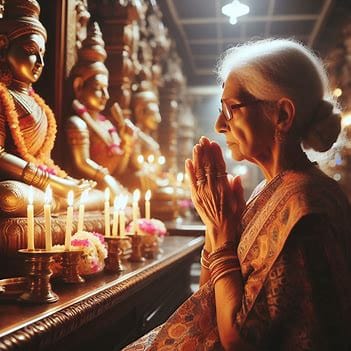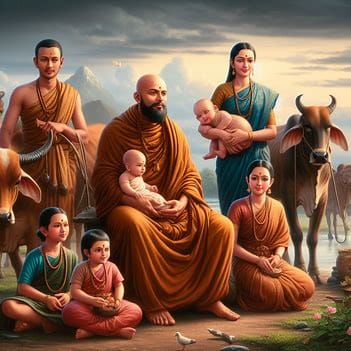What is the most powerful prayer? Is it wrong to ask God for material things? If I have impediments in my spiritual sadhana, can I ask God for blessings to remove them?
To reach a consensus on the most powerful prayer, let's begin by reflecting on why we pray to God, what our true relationship with Him is, and developing an understanding of who am I.

What motivates our prayer?
According to Bhagavad Gita verse 7.16 (commentary by Swamii Mukundananda), four kinds of people take refuge in God and have distinct motivation behind their prayers.
1. The distressed
Those who find that their pot of worldly miseries is overflowing, and they are unable to cope with them conclude that it is futile to run after the world. Thus, decide to take shelter in God. Similarly, those who find that the worldly supports fail to protect them; turn to God for protection.
2. The knowledge seekers
There are some people who have heard about the opulence of God and His spiritual realm. Thus, they are curious to know all about God and try to seek Him through knowledge.

3. The seekers of worldly possessions.
Some people are clear about what they want and take the shelter of God because they are convinced; that only God can provide what they are seeking.
4. Those situated in knowledge.
Lastly, those souls who have understood the truth that they are tiny parts of God. Such people engage in devotion with the intent that it is their eternal duty to love and serve Him. Shree Krishna calls them the fourth kind of devotees.
Understanding Bhakti, Sakaam Bhakti and Nishkaam Bhakti
The Sanskrit term Bhakti, is generally understood as engaging in prayer to God or practicing devotion to God.
The Vedic scriptures have categorized Bhakti into two kinds:
Sakaam Bhakti – When we pray to God for fulfillment of our desires. The first three out of the four categories of people we listed above are engaging in Sakaam Bhakti. Their prayer is motivated by personal lacks, desires or distress in life.
Nishkaam Bhakti – When we pray to God to serve Him and give Him happiness. Only the fourth category of people, who are situated in knowledge, engage in Nishkaam Bhakti.
Before we dive into the details of Nishkaam Bhakti and how to attain it, let's ponder on why bhakti or devotion should be devoid of desires.

Why prayer should be devoid of selfish desires?
Swami Mukundananda constantly reminds us against praying to God for our puny materialistic desires. If you have been following Swamiji, you must have heard from him - “God is not a cosmic bell-boy!” There are several problems with this type of “business” relationship with God:
Firstly, if we go to God with material desires, our mind will remain entangled in the world. It will not go to the Lotus feet of the Lord and hence it will not get purified. Like for example, if you go for 40 days to the temple of God to pray for your ill child to get better. It may seem that you are going for 40 days to do bhakti, but your mind is in your child. So factually what you're doing is bhakti of your child, care of the Lord. And because the mind is in the world, it doesn't get cleansed.
Secondly these desires which we present before God, they have no end. One is fulfilled and the other arises. Today you say – “Oh God, you please fulfill this one desire of mine." After that I will never ask you for anything else. Tomorrow you will say, “Oh God, I have one more thing to ask of you. If this is done, I'll never ask again.”
Where will the chain of prayers for material desires lead us?
Lets understand from this story.
On one Guru's instruction, a renunciate monk went to a secluded place to engage in sadhana.

However, when he would place his clothes on the wall to dry, a mouse would come and nibble at it. The nearby villagers advised him to keep a cat to drive away the mouse.

Thinking it to be a good idea, he kept a cat. But now the cat needed to be fed, so the villagers again suggested it would be nice to keep a cows whose milk he and the cat both could subsist upon.
He accepted that idea as well and now he had a cow in his ashram. But the cow needed to be taken care of. Some of the well-meaning villagers said, “look Maharaj, we all have our wife at home, who helps us out. Why don't you also keep one.”
The monk agreed and he married and had a wife now. They had three children and the needs increased so they kept more Cows. And to take care of them a few laborers were required. They were also placed in the nearby Fields until a whole Little Village got created.
Guruji happened to visit his disciple and seeing the state of his disciple said, “son, what happened to you?”
And the disciple said, “Guru Ji, this was all because the mouse used to come and nibble at my clothes.”

So, material desires will continue without end. If we keep those as the focus of our prayer, it will lead to getting trapped in the endless cycles of life and birth
Bhagavad Gita | Verse 3.42 | Commentary by Swami Mukundananda
The real form of this tree is not perceived in this world, neither its beginning nor end, nor its continued existence. But this deep-rooted aśhvatth tree must be cut down with a strong axe of detachment. Then one must search out the base of the tree, which is the Supreme Lord, from whom streamed forth the activity of the universe a long time ago. Upon taking refuge in Him, one will not return to this world again.
Is it okay to pray for liberation from material bondage?
Liberation or peace or mukti or moksha is the goal of many. All these words indicate a freedom from sorrow, pain, and suffering. Attaining liberation means attaining freedom from the cycle of birth and death.
Liberation is considered the most dangerous it eternally robs the soul of its loving relationship with God and the opportunity to serve Him for His pleasure. Thus, the wise devotee rejects liberation.
Srimad Bhagavatam verse 1.1.2 states dharmah projhita kaitavah.... What is the true dharma of an individual? That which is free from all selfishness.
It is better to target a higher goal (i.e., Bhakti) even if difficult, than to target a lower goal (i.e., Mukti).
Hence, any prayer that focuses on seeking liberation also cannot be deemed as the most powerful prayer.
Do we really know what to pray for?
If you place a child in a jewelry shop and put a little chocolate in front and ask the child pick what you want? Is the child going to pick the Priceless Jewel? Of course not! It only knows the value of chocolate.
Likewise, our intellect is stuck on material things since endless lifetimes. We are unaware of the divine bliss of God.
Before we can come up with the most powerful prayer, it is crucial to comprehend who we are and what is our constitutional relationship with God.
Who am I?

The topic of Who Am I deserves its own blog. Nonetheless, we will briefly discuss it as we develop our analysis to come to consensus on the most powerful prayer.
Religious practitioners, philosophers, thinkers and scientists alike are struggling endlessly to find the answer to this question. Each school of thought has its own story to tell. Scientists hypothesize that we are nothing but a bunch of chemicals. Philosophers like to debate about the existence of some consciousness.
Bhagavad Gita | verse 3.42 | commentary by Swami Mukundananda
indriyāṇi parāṇyāhur indriyebhyaḥ paraṁ manaḥ
manasas tu parā buddhir yo buddheḥ paratas tu saḥ
The senses are superior to the gross body and superior to the senses is the mind. Beyond the mind is the intellect, and even beyond the intellect is the soul.
Bhagavad Gita | Verse 15.7 | commentary by Swami Mukundananda
mamaivansho jiva-loke jiva-bhutah sanatanah
manah-shashthanindriyani prakriti-sthani karshati
The embodied souls in this material world are My eternal fragmental parts. But bound by material nature, they are struggling with the six senses including the mind.
The Soul is a part of God. Every part constitutionally serves the whole. Therefore our true nature is to serve God. Those of us who rise above material consciousness and realize this truth are blessed beyond measure.
This knowledge of the self then naturally prompts us to seek out the true purpose behind human existence. Obviously, the most powerful prayer we are striving for must be in alignment with that purpose.
What is the ultimate goal of human life?
"Knowledge of the nature of the self is the basis for the Spiritual path. When we are the soul, not the body, our goal is God, not the world" - Swami Mukundananda
The Vedic scriptures unanimously acclaim that the goal of human life is attainment of God. The individual soul seeks to achieve a blissful state because it is a part of God, who is an ocean of bliss.
Bhagavad Gita | Verse 6.21 | Commentary by Swami Mukundananda
sukham ātyantikaṁ yat tad buddhi-grāhyam atīndriyam
vetti yatra na chaivāyaṁ sthitaśh chalati tattvataḥ
In that joyous state of Yog, called samadhi, one experiences supreme boundless divine bliss, and thus situated, one never deviates from the Eternal Truth.
Saint Kabir also said,
Kabira Sab Jag Nirdhana, Dhanwanta nahi koi
Dhanwanta Sohi JaaniyeJahi Prem Dhan Hoye
Everyone in this world is poor . Only that person is rich who has experienced the divine love of God.
Lets try and expand on this with the help of this story.
One wood cutter was passing through terrible times. He approached a monk who used to live nearby and said, “Guruji what should I do to increase my income?”
The monk suggested he go deeper into the forest where he would find Sandalwood trees.
This wood cutter now found the sandalwood Forest. His problems were solved, and he returned to thank the monk. The monk then advised him if he went even deeper, he would find a silver mine.
The wood cutter proceeded to discover the silver there and came back to thank the monk. The monk then advised, “you can go even further, and you'll find a gold mine.”
The wood cutter followed suit and discovered the gold mine and then came back and said to the monk, “Guruji, when you knew of the existence of all these Treasures, why did you not pursue them for yourself?”
Guru Ji said, “All of these will have to be left behind one day. I am seeking the treasure that lies within myself which will continue with me lifetime to Lifetime.”
This brings us to the principle of “nishkaam bhakti”, where we neither ask God for material gratification nor for Liberation from Material bondage and not even for divine bliss.
Nishkaam Bhakti - essential ingredient for the blossoming of the most powerful prayer.
Swami Mukundananda, in his Daily Sadhana course curriculum, takes us even one step beyond the attainment of divine bliss. He states that the purpose behind engaging in devotional prayers should not be limited to attainment of Divine bliss of God for our own happiness.
According to Swamiji, selfless love is not about seeking reciprocation, which is why it cannot be destroyed like the worldly love. True love is about serving the Lord in the form of time, effort, faith, devotion, and love, for His happiness.
Here in lies the essence of Nishkaam Bhakti: when we do not even seek the divine bliss of God for our own Happiness, but only to give happiness to our beloved.

Bhagavad Gita | Verse 7.17 | Commentary by Swami Mukundananda
"Amongst these, I consider them to be the highest, who worship Me with knowledge, and are steadfastly and exclusively devoted to Me. I am very dear to them and they are very dear to Me."
Swami Mukundananda elaborates on this verse - Those who are seeking God in distress, for worldly gains or out of curiosity, etc. are yet to possess selfless devotion. Gradually in the process of devotion, their hearts become pure, and they realize their eternal relationship with God. Then they develop selfless, exclusive, and incessant devotion toward Him. Now that they have the knowledge that the happiness of the world is temporary and God is the source of eternal bliss, they neither crave for favorable circumstances nor lament over reversals in the world. They become situated in selfless devotion with complete self-surrender.
This means that we must be cognizant of our selfish desires and strive to sacrifice them so that we have only one desire left i.e. to serve God for His happiness.
Read inspiring stories from Ramayan about what is true love for God.
What then would be The Most Powerful Prayer?
Now that we have a good understanding of our most ultimate goal of serving our divine beloved God, which is even beyond the attainment of divine bliss, it would be a no brainer to come up with the most powerful prayer what we can all agree upon .
Lets read this excerpt from Swamiji's recently published book, “Questions you always wanted to ask”
"You can selflessly seek God's help in overcoming a barrier to your devotion. Remember not to demand that he make your situation more comfortable for you. Instead make your prayer something like this, "oh Shri Krishna (or any form of God), I wish to serve you with all my heart, but due to my material infirmities I fall short. Please bestow on me the faith, devotion and self-control that I may serve you well. If you wish to remove obstacles I face in bhakti, it is up to you. Whatever be the case I will continue putting all my best efforts in loving service to you."

The beauty of this prayer is that we are putting the outcome in God’s hands without any insistence or demands from our side.
The obvious question arises, will I miss out on my happiness and divine bliss if I only pray to love and serve God for His happiness?
Lets get the answer from Bhagavad Gita verse 9.22
How the most powerful prayer pleases God?
Bhagavad Gita | Verse 9.22 | Commentary by Swam Mukundananda
There are those who always think of Me and engage in exclusive devotion to Me. To them, whose minds are always absorbed in Me, I provide what they lack and preserve what they already possess.
When a devotee loves God selflessly and gives whatever he possesses, the Lord too gives everything He possesses to the devotee. The tiny soul and the almighty Lord give whatever they have to each other. The devotee’s love enslaves God.

God already knows what each of us wants because He resides in our heart and notes each and every thought and action (karma). We do not need to ask for anything. If we just offer our sevas (service) with love and devotion, God will provide whatever we need to make spiritual progress in life. Additionally, He will protect whatever spiritual earning we have accrued. Like Lord Krishna told Arjun:
The kind of devotion that binds and enslaves God is the very devotion we should prioritize and aim for in our lives. In that state of heightened God consciousness, we will effortlessly evoke the most powerful prayer.
FAQs on The Most Powerful Prayer
Q. In order to develop love for God, one needs to detach from the world, then how can one fulfill their duties to their family, profession, and community?
According to Swami Mukundananda - Fulfilling duties is one matter, getting attached is another matter. Attachment means the object we are attached to or the personality has clasped our mind. Now, it's possible somebody is attached to her child while she is performing her duties in the office. Somebody is attached to the dog and is doing duties to the world. So, people have attachments in one place, and they are working in another. Veritably if they analyze themselves, they will discover most people’s attachment is to their family members and to the whole world they are only doing their duty. Now that duty gets polished up as etiquettes, the external behavior. This is what people keep doing all day long and the mind is clasping on to the few members at home.
Now don’t be attached to the family as well. You just do your duty to them like you are doing to the whole world. Your mind will then become free. With that free mind, then you can think of God. So factually if you can give up that attachment, you will discover that you are able to do your duty to the worldly people even better than before.
Detachment from world and love for God
Q. How can I learn more about the nature of this world ?
BEWARE - The 3 Defects of our Mind | Swami Mukundananda - https://www.youtube.com/watch?v=KwK9GoS7dWc
This World and our stay in it is temporary, but our mind makes us think that it's permanent and eternal. 2. We are the Soul NOT the Body. When the Soul forgets this, it endeavors to enjoy the material pleasures which are the very source of it's miseries. 3. Our mind can delude us to think that the miseries of this world are the source of our happiness. With that thinking, the soul endeavors to enjoy the temporary pleasures of this world and suffers in this cycle of Birth and Death. However, real happiness is only with God and not in the pleasures or things of the world. Once we repeatedly contemplate the reality of this world and our soul, we can detach our mind from the world and attach it to God, who is the source of Infinite Bliss.
Q. How can I increase my understanding of Nishkaam Bhakti and bring it into practice?
Life is all about making the right choices. At every moment we have a choice, what to think, what to do? Your choices will depend on your knowledge. If you have the proper knowledge, you can make a more informed choice. If you wish to choose well and don’t have the proper value system, it will not happen. Start by contemplating over the question-what is the purpose of my life.
Read entire chapter 7 of the Bhagavad Gita Commentary by Swami Mukundananda - Yog through the Realization of Divine Knowledge
Revise often this short message from Swami Mukundananda - What Devotion or Bhakti Means
Watch this message by Swami Mukundananda - Working in divine consciousness
Working in divine consciousness
Q. Does JKYog and Swami Mukundananda offer any courses that can help to increase my God consciousness.
Take the 21 day Get closer to God challenge on Radha Krishna Bhakti App.
Check here for details on how to download the Radha Krishna Bhakti App
Also checkout the Daily Sadhana Portal. Begin your Daily Sadhana journey with Fundamentals of Vedic Philosophy course, that allows you to take Secrets of Vedic Philosophy and Advanced Vedic Philosophy. Learn the timeless secrets of the Vedic literature.
JKYog also offers numerous online classes on varied spiritual topics. Check class details and schedule here.

